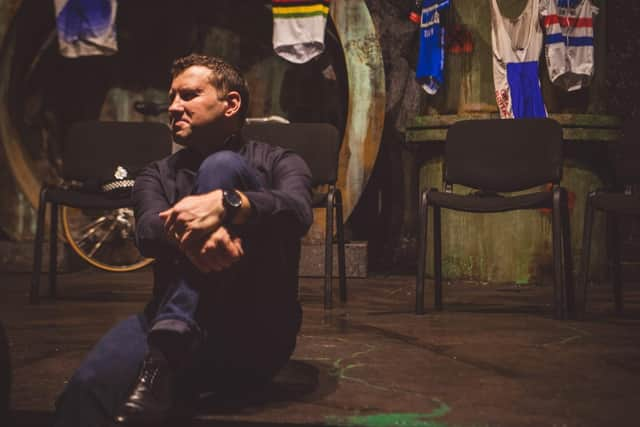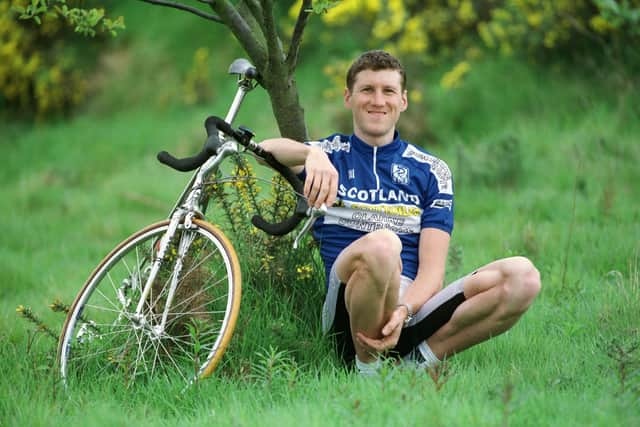The Tour de France has a Buffalo-shaped hole in it – I wish Richard Moore was still here to explain its mysteries to me
As absurd as it may seem, needling someone is often a sign of love. I guess it’s one reason why on the times Richard Moore phoned me when I was off to interview the Dundee manager, as he seemed to suggest was regularly the case, he’d reply with reference to someone who had not held the post for comfortably over a decade: “Is that still Jocky Scott?”
It’s why, when phoning him a couple of weeks into the Tour de France, and, having let him explain where he was (as if I didn’t know), I’d reply: “Oh, is that still going on?”
Advertisement
Hide AdAdvertisement
Hide AdAffecting disinterest – to be fair, in the case of Dundee FC, it really was disinterest on Richard's part – was the reflex mindset.
But oh, how I wish that hadn’t been the case now as I sit here on the first weekend of the 109th edition of the Tour de France. A copy of Etape – Richard’s acclaimed love letter to the near-month long event, where he tells the story behind some of the defining stages in the race’s history – lies on a nearby bookshelf.
It makes me think of a line by the late, great Scottish journalist, AA Gill. In a tour de force essay for the Sunday Times to mark his 60th birthday, Gill lamented his complacent attitude towards pals. “Now their absence and my casual wastefulness upsets me,” he wrote.
I know where Adrian – like Richard, Edinburgh-born – was coming from. For so long I had a hotline into one of the great nerve centres of the Tour de France.
If things were different, Richard might well have been filling this space in this edition of Scotland on Sunday. He often did at this time of year.


His professional life, though, came to be dominated by the Cycling Podcast, the media company he founded in 2013 with friends and colleagues Lionel Birnie and Daniel Friebe. They have since produced over 1200 episodes. Things really crank into gear around the Tour de France. I’d call for the lowdown.
Except, as the Cycling Podcast car rolled on through the Alps and the Pyrenees, through the sun-soaked plains of the Midi and the rain-lashed cobbles of the north, we’d speak about nearly everything else except what was going on in the actual race he was covering – nights out (not that the Tour de France’s relentless pace makes many of these very advisable)…who was irritating who…the latest Morrissey let down.
Actually, maybe it’s just as well I didn’t ask for details about the race itself. The shock might well have caused Richard to swerve off the road. Because it was usually Richard driving, in his role as leader, lynchpin, friend and brother, which is how he was described when the Cycling Podcast announced his death in March, aged only 48.
Advertisement
Hide AdAdvertisement
Hide Ad“Interesting that – starting a sentence with ‘because’…” I can hear him chide me. Because – woops, there it is again – it has barely begun to sink in that my best friend has gone.


I can imagine the sense of loss felt right now amongst friends, colleagues and even riders in France. Or, indeed, in Denmark, since even I know that the Tour de France has started in Copenhagen this year.
“There is,” Birnie wrote in a letter to Cycling Podcast subscribers last week, “a huge Buffalo-shaped hole in our team.”
The Buffalo was the nickname given to Richard because of his ability and eagerness to forge ahead and get the job done, whether it be interviewing riders, or making reservations for that night’s meal after a long, arduous day staying just ahead of the peloton. It’s an assignment requiring far more gumption and zest than simply sitting in a press box for 90 minutes.
During the coming days the race will wend its way through places like Calais and Lille in the north of France, not far from Richard’s adopted home of Picardie.
Pouring further poignancy on the Cycling Podcast team’s adventures this month – recently retired professional rider Mitch Docker has been added to the line-up - in the knowledge that each hotel on their itinerary was carefully selected and booked by Richard shortly before he passed away.
They will be sleeping and eating and drinking at his invitation. He has prepared the way. The Buffalo has exceeded himself.
I now treasure my first and now probably last Tour de France experience, when, at Richard’s insistence, I headed out for the final three stages in 2009.
But even that is tinged with some regret.
Advertisement
Hide AdAdvertisement
Hide AdThe trip included an unforgettable experience near the Tom Simpson memorial on Mont Ventoux. And yet I can remember telling Richard the best bit was visiting the amphitheatre in Orange where The Cure had recorded a full-length concert film in 1986.
What does, in truth, stick in the mind most was witnessing how well-regarded Richard was by one of cycling’s biggest names. As he subsequently recalled in Slaying the Badger, about the 1986 race eventually won by Greg LeMond after an explosive battle with teammate Bernard Hinault, “a figure appeared over the brow of the hill, negotiating the loose scree of a white hillside that looks like the surface of the moon…”
Surreal though it was, even I recognised LeMond emerging from the cloud of dust near the top of the mountain, as David Millar et al strained every sinew in the lung-busting ascent, one of cycling's great climbs.
Richard used his charm to acquire the famously hard-to-pin down LeMond’s business card. A short time later he was being hosted by Greg and his wife Kathy at their home in Minnesota as he carried out research for the above book.
Staying at Richard’s house after his funeral in April, I noticed flowers placed in a vase on the table in the kitchen. I flipped over the tag to discover they were from a couple in the States. Name of LeMond.
Comments
Want to join the conversation? Please or to comment on this article.